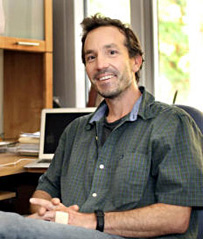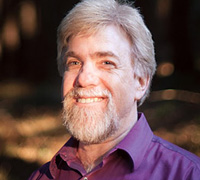UC Santa Cruz biomolecular engineer Joshua Stuart is a principal member of a new "Dream Team" of cancer researchers working to develop personalized treatments for advanced prostate cancer.
Stand Up To Cancer (SU2C) and the Prostate Cancer Foundation (PCF), along with the American Association for Cancer Research (AACR), have announced a $10 million, three-year grant to fund the new project, which aims to overcome the treatment resistance that can develop in advanced prostate cancer. It is the second SU2C Dream Team project dedicated to prostate cancer research. UCSC researchers are also involved in an ongoing SU2C Dream Team project on breast cancer.
Stuart, an associate professor of biomolecular engineering in the Baskin School of Engineering, will lead a small team of UCSC researchers working on key aspects of the prostate cancer project. One of their responsibilities is to identify genetic pathways in prostate cancer cells that are involved in the development of treatment resistance. They will also be looking for potential drug targets within the networks of molecular interactions involved in resistance. Cancer genomics tools developed at UCSC are crucial to this work, which will ultimately allow doctors to identify the causes of resistance in individual patients so that treatment can be tailored based on the genetic signature of each patient's tumor.
A second component of the UCSC team's work will be to develop a novel application called MedBook to connect patients, doctors, and researchers. Inspired by social media, MedBook is the brainchild of UCSC graduate student, Foundation trustee, and former Apple executive Ted Goldstein, who has described it as a "Facebook for cancer." The idea is to bring together the findings from patient tumor samples and connect researchers in a way that will help them work collaboratively to discover new models of disease and match patients with targeted treatments.
"The precision prostate oncology MedBook will act like an iPad app, linking patients, doctors, and researchers in a participatory information platform that will speed the matching of new medicines targeted at new druggable pathways to the patients who will benefit most," said Jonathan Simons, M.D., president and CEO of the Prostate Cancer Foundation.
UCSC researchers led by Nader Pourmand, associate professor of biomolecular engineering, will also be involved in sequencing the RNA from prostate cancer samples.
Overall leadership for the new Dream Team is provided by Eric J. Small, M.D., professor of medicine and urology and chief of the division of hematology and oncology at UCSF, and Howard Hughes Medical Institute investigator Owen N. Witte, M.D., distinguished professor of microbiology, immunology and molecular genetics at UCLA. Also involved are scientists at UC Davis, Oregon Health & Science University in Portland, and the University of British Columbia in Vancouver.
Prostate cancer is the second most common cause of cancer death for men in the United States. According to the Prostate Cancer Foundation, one man dies every 18 minutes from this disease and a new case occurs every 2.1 minutes. More than 2 million American men are living with prostate cancer and more than 16 million men are affected worldwide.
The SU2C Dream Team will explore the idea that resistance is a result of the prostate cancer cells using common cellular responses, called adaptive pathways, to escape current therapies. The team believes that by identifying these pathways and inhibiting them, they will be able to overcome treatment resistance and profoundly improve survival and quality of life for these patients.
The Dream Team proposes to centralize and integrate the considerable amount of data generated by their work into MedBook, which will use a simple social media concept to support information exchange and discussion. The centralized information will be updated continuously based on new data, and it will contribute to the development of molecular disease models that codify the most current clinically actionable adaptive pathways in metastatic treatment-resistant prostate cancer. This information will be instrumental to the team's clinical working group for recruiting patients to specific trials.
The project is estimated to start later this fall, with the first clinical trials scheduled to open in 2013.




